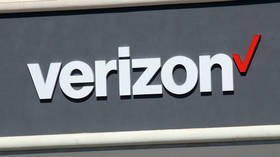Verizon puzzled by spoof messages from unknown senders

US cell phone carrier Verizon has admitted its users are receiving strange spoofed text messages from their own phone numbers offering them a tempting “gift” for having paid off their latest phone bill. However, it isn’t sure how or why this is taking place – or who’s responsible.
The company is “aware that bad actors are sending spam text messages to some customers which appear to come from the customers’ own number,” Verizon spokesperson Rich Young acknowledged in an email message to multiple media outlets on Tuesday.
Young insisted Verizon was “actively working to block these messages” and even working with US law enforcement to “identify and stop the source of this fraudulent activity.”
It’s not clear if the spam messages are aimed at any particular user demographic, though users across North America have reported the problem.
The Verge correspondent Chris Welch claimed his own personal spam link sent him to Channel One Russia, a state-run media network, but it’s not clear if any other experiences with Russian sites have been reported and the company said there was “no indication” that the texts were originating in Russia.
Many customers are wisely reluctant to open messages sent from unknown numbers containing links, as high-end spyware apps like Israel’s Pegasus may use ‘zero click’ exploits that don’t require the target to actually interact with the sender’s message at all before hijacking their camera and microphone and gaining access to their private messages, contacts, and other protected content.
Especially suspicious is the Verizon spam message’s offer of “a little gift” in exchange for the user having paid their latest bill.
Verizon told Fox affiliate KTTV to avoid clicking on the link at all costs, then forward the message to “SPAM” (7726) with the added text “spoofed number.”
The company promised Verizon would not block their own numbers as punishment. Customers were also advised to tweet at Verizon’s support account on Twitter if they wanted to discuss the matter with customer support.













